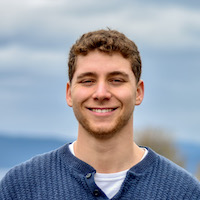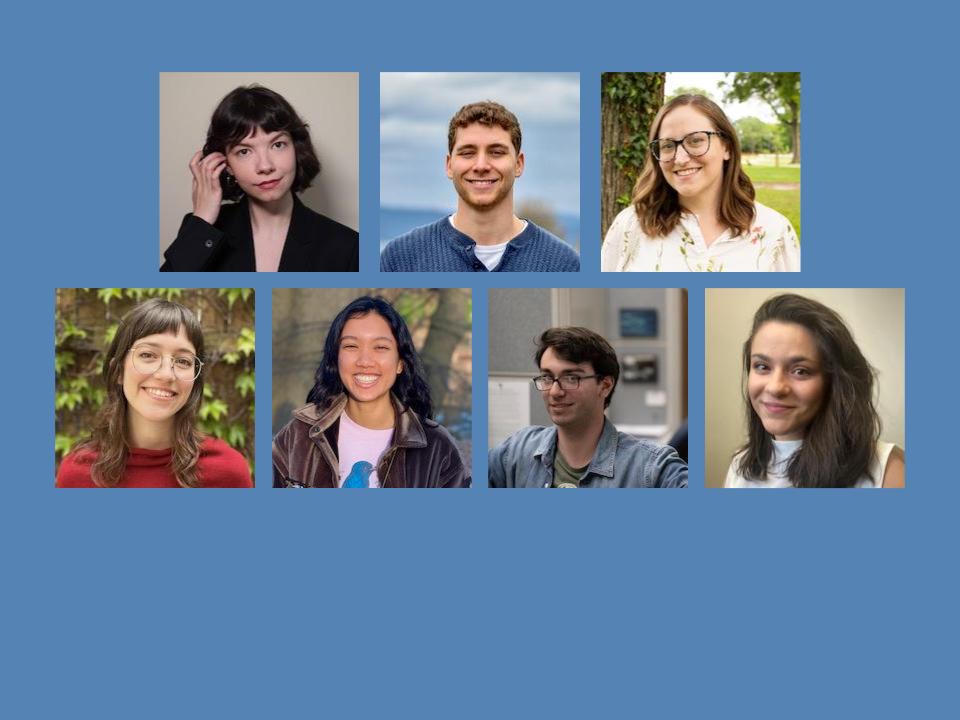
Seven journalists awarded 2025-26 Taylor/Blakeslee Fellowships
Seven journalists with experience in beats from medicine and biology to neurodegeneration and the environment have been awarded Taylor/Blakeslee Graduate Fellowships from the Council for the Advancement of Science Writing for the 2025-’26 academic year. Each fellow will receive $6,000 to support their attendance in a graduate science writing program, thanks to funding from The Brinson Foundation.
“I’m deeply honored to receive the Taylor/Blakeslee Graduate Fellowship,” says fellow Alonso Daboub. “As a Latino, I’m especially aware of the urgent need for high-quality, informed science reporting that not only reaches, but meaningfully supports, marginalized communities. CASW’s support is a crucial step in helping me contribute to this mission in both English and Spanish.”
One fellow, Ana Georgescu, will receive an enhanced fellowship designed to encourage coverage of the physical sciences, such as chemistry, physics, and math. Georgescu’s award includes mentorship from a senior journalist with experience covering the physical sciences and up to $3,500 in travel funding. Past mentors include Dennis Overbye and Natalie Wolchover.
“With CASW’s support and the guidance of my mentor, it feels possible to take on bigger, bolder stories, especially in physics,” Georgescu says. “It’s a field that’s close to my heart, full of exciting developments in both academic and industry research, and I’m eager to tell the stories behind them.”
The seven fellows were chosen from an exceedingly competitive pool. Their selection brings the total number of science writers aided by CASW’s graduate fellowships since 1981 to 205.
“The Taylor/Blakeslee program attracted more applicants this year than it has in previous years, going back at least a decade,” said Alan Boyle, chair of CASW’s Awards and Fellowships Committee. “That didn’t make it easy for the judges, but it does serve as a sign that students are truly eager to become part of the next generation of science journalists. We’re grateful to the Brinson Foundation for their support of this important program.”
“Receiving the Taylor/Blakeslee fellowship means so much to me, both personally and professionally,” says fellow Ashley D’Souza. “My goal as a writer and naturalist is to heal how people relate to the environment. This fellowship will help support my studies so I can become a stronger journalist and storyteller and make a real impact. I’m so grateful to CASW for believing in me.”
Here are the seven fellows for 2025-’26:
 Bridget Balch is a journalist covering medical education, research, and health care for AMCNews, a publication of the Association of American Medical Colleges. She has reported for the Houston Chronicle and the Richmond Times-Dispatch, where she wrote an investigation into hospital-sponsored legal guardianship that resulted in a change in state law as well as earned an Association of Health Care Journalists award and recognition as a Livingston Finalist. This fall, she will be pursuing a Master of Arts with a Science Concentration at Columbia Journalism School, where she intends to focus on neuroscience and degenerative brain disorders. She graduated from the University of Mary Washington with a degree in English and Spanish.
Bridget Balch is a journalist covering medical education, research, and health care for AMCNews, a publication of the Association of American Medical Colleges. She has reported for the Houston Chronicle and the Richmond Times-Dispatch, where she wrote an investigation into hospital-sponsored legal guardianship that resulted in a change in state law as well as earned an Association of Health Care Journalists award and recognition as a Livingston Finalist. This fall, she will be pursuing a Master of Arts with a Science Concentration at Columbia Journalism School, where she intends to focus on neuroscience and degenerative brain disorders. She graduated from the University of Mary Washington with a degree in English and Spanish.
Alonso Daboub will attend the UC Santa Cruz science communication master’s program this fall. After graduating from the University of British Columbia, where he studied integrated science with an emphasis in neurobiology, he joined the 2024 class of AAAS Mass Media Fellows. As the cohort’s Spanish-language fellow, he covered climate, ecology, and neuroscience for El Nuevo Día, Puerto Rico’s leading newspaper. Alonso’s journalism is primarily focused on urban ecology and the impacts of human activity on the natural world. He currently works as a Communications and Outreach Coordinator at the Colorado Department of Public Health and Environment’s Air Pollution Control Division, where he focuses on bridging the gap between policy and marginalized communities.
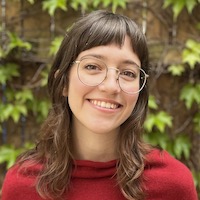 Rachel Duckett will attend Northwestern University’s master’s in journalism program in the fall as a Comer scholar, focusing on environmental, health, and science journalism. Previously, she reported for NPR affiliates in East Lansing, Michigan and the Quad Cities, the latter earning her two awards from the Iowa Broadcast News Association. She also reported on environmental issues in the Great Lakes basin for Great Lakes Now, a Detroit Public Television initiative. She attended Michigan State University for her bachelor’s degree, where she worked as a copy editor for the Spartan Medical Research Journal. Rachel hopes to combat scientific misinformation and shine a light on health and environmental disparities with clear, compassionate storytelling.
Rachel Duckett will attend Northwestern University’s master’s in journalism program in the fall as a Comer scholar, focusing on environmental, health, and science journalism. Previously, she reported for NPR affiliates in East Lansing, Michigan and the Quad Cities, the latter earning her two awards from the Iowa Broadcast News Association. She also reported on environmental issues in the Great Lakes basin for Great Lakes Now, a Detroit Public Television initiative. She attended Michigan State University for her bachelor’s degree, where she worked as a copy editor for the Spartan Medical Research Journal. Rachel hopes to combat scientific misinformation and shine a light on health and environmental disparities with clear, compassionate storytelling.
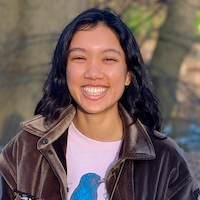 Ashley D’Souza writes to bring people closer to the nature around them. They believe that conservation efforts depend on individuals developing personal relationships with wildlife, and their passion for the environment led them to journalism. After graduating from Rice University with a degree in computer science, they left a career in software engineering to pursue writing. They’ve spent the last two years as a freelance multimedia journalist, covering topics from bird flu and beech leaf disease to anti-abortion centers and housing inequity. Ashley will join the science writing program at MIT this fall, where they are excited to expand their writing to a national audience and hone their skills in connecting readers to the natural world.
Ashley D’Souza writes to bring people closer to the nature around them. They believe that conservation efforts depend on individuals developing personal relationships with wildlife, and their passion for the environment led them to journalism. After graduating from Rice University with a degree in computer science, they left a career in software engineering to pursue writing. They’ve spent the last two years as a freelance multimedia journalist, covering topics from bird flu and beech leaf disease to anti-abortion centers and housing inequity. Ashley will join the science writing program at MIT this fall, where they are excited to expand their writing to a national audience and hone their skills in connecting readers to the natural world.
 Ana Georgescu will attend MIT’s science writing master’s program this fall. Originally from Romania, she is currently based in New York City, where she works for a science communications agency. She has a bachelor’s degree in astrophysics and physics from Harvard University. She is particularly interested in writing about physics and the scientific, political, and personal forces that shape how discoveries emerge, are communicated, and are ultimately understood by the public. She hopes to write stories that not only clarify scientific developments but also challenge readers to consider their broader context and consequences.
Ana Georgescu will attend MIT’s science writing master’s program this fall. Originally from Romania, she is currently based in New York City, where she works for a science communications agency. She has a bachelor’s degree in astrophysics and physics from Harvard University. She is particularly interested in writing about physics and the scientific, political, and personal forces that shape how discoveries emerge, are communicated, and are ultimately understood by the public. She hopes to write stories that not only clarify scientific developments but also challenge readers to consider their broader context and consequences.
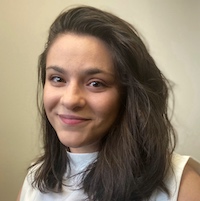 Stella Mayerhoff is a doctoral candidate studying primate cognition and behavior at Georgia State University. She has worked with numerous primate species in diverse settings, from Puerto Rico to the Democratic Republic of Congo. Stella draws inspiration from her time in the field, writing to share the sense of adventure and real-world impact that science offers. She has written for Georgia State’s College of Arts & Sciences, Georgia State University Research Magazine, and Science ATL. She has also brought her field experiences to the stage as a storyteller for The Story Collider. This fall, she will join the UC Santa Cruz science communication master’s program, where she plans to report on psychology, wildlife, and human-animal connections.
Stella Mayerhoff is a doctoral candidate studying primate cognition and behavior at Georgia State University. She has worked with numerous primate species in diverse settings, from Puerto Rico to the Democratic Republic of Congo. Stella draws inspiration from her time in the field, writing to share the sense of adventure and real-world impact that science offers. She has written for Georgia State’s College of Arts & Sciences, Georgia State University Research Magazine, and Science ATL. She has also brought her field experiences to the stage as a storyteller for The Story Collider. This fall, she will join the UC Santa Cruz science communication master’s program, where she plans to report on psychology, wildlife, and human-animal connections.
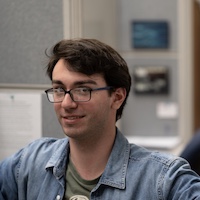 Alex Megerle is a biologist-turned-writer who loves a good story and the wild things in life. Originally from New Jersey, Alex earned a Bachelor’s degree in biology and bioengineering from Lehigh University and worked on research projects in Pennsylvania, Massachusetts, New Mexico, and Ireland before combining his passions for biology and creative writing into a science communication career. He has written for The Enterprise newspapers on Cape Cod, the nonprofit Advocates for Snake Preservation, and the world-renowned Marine Biological Laboratory. Beginning this fall, Alex will be attending the science writing master’s program at MIT, where he is excited to grow as a communicator and cover the natural world and humanity’s relationship with it.
Alex Megerle is a biologist-turned-writer who loves a good story and the wild things in life. Originally from New Jersey, Alex earned a Bachelor’s degree in biology and bioengineering from Lehigh University and worked on research projects in Pennsylvania, Massachusetts, New Mexico, and Ireland before combining his passions for biology and creative writing into a science communication career. He has written for The Enterprise newspapers on Cape Cod, the nonprofit Advocates for Snake Preservation, and the world-renowned Marine Biological Laboratory. Beginning this fall, Alex will be attending the science writing master’s program at MIT, where he is excited to grow as a communicator and cover the natural world and humanity’s relationship with it.
